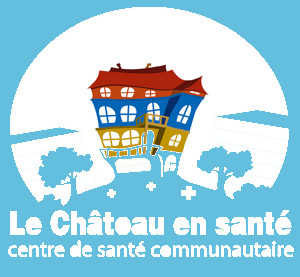This article is part of a series being shared to highlight activist struggles across Europe and grassroots response to health and economic crisis. These articles are shared in preparation for the event ‘Reclaiming the commons: From austerity and debt to public space and health as commons’ which will take place next Wed 27th Jan.
Author: Alima Elbajnouni
Specificity of commoning :
 Describe what are the specific ways of acting together within the scope of the chapter
Describe what are the specific ways of acting together within the scope of the chapter
“Le Château en santé was born from a group of reflection and action, the Massilia Santé System. This group developed critical thinking about the health system, took a stand and tried to bring about changes in care practices. At the outset, there was therefore a common political culture”.
“We noted that advocacy, understood as defending something collectively and aspiring to transform things, is one of our institutional missions. »
Le Château en santé is a participatory health centre. It is set up as an association (French law 1901). Its members have opted for a collegial mode of governance to break away from the classic hierarchical system and to better distribute power. The team is made up of professionals and volunteers. The clearly stated aim is to involve the inhabitants in the running of the centre.
Le Château en Santé worked for 2 years with a team of anthropologists from the LaSSA (Laboratory of Applied Social Sciences) to design and structure its participatory approach. This work resulted in a report entitled “From the haunted castle to the Château en Santé. Thinking about the participatory approach of a community health centre in Marseille”.
Thematic participatory workshops with the inhabitants of Kallisté were set up in 2018.
In 2019, the workshops were based on different topics (parenthood and the parent-child relationship, medical prescriptions, the language of the child, etc.). A women’s walking group was also set up on the initiative of patients.
Political strategies :
This is a work in process, both for professionals and users, on various advocacy issues, our top priority remains to reflect on how we welcome, how we care… This amounts to making “politics” all together, even if it is a slow construction.
A critical approach to the system of care and patient management is at the heart of the Château en Santé project, as well as the “thinking about power in the system of care”.
The horizontal management of the association is a way of putting into practice the values carried by the association. For the moment, the participation of the inhabitants is limited to collective workshops. But very early on, the desire for greater inclusion in management bodies was affirmed. Confronted with practical difficulties, this project needs more time for its implementation.
Methodologies, pedagogy :
“Our operating model is unusual and can be quite different from the examples of practice evoked during our various studies…Students often have only a very binary vision of their work possibilities at the end of their studies, particularly in the medical field….
The mission of fighting against social inequalities in health, of reflecting on power in health care and the notion of community health have so far been taught and transmitted very little. These notions reflect the very identity of the Château en Santé and the transmission represents a crucial point, particularly in raising awareness among the young, and of perpetuating the project and, why not, of seeing other places emerge with the same ideal of health.
Legal Framework :
The Kallisté health centre was intended to follow in the footsteps of the community health centres (Community health aims to “empower people”, to put them in a position to get involved” – in “Pour un débat citoyen sur la santé plus actif Rapport d’étude – July 2011).
Community health emerged in France in the 1980s, after Quebec which was a pioneer in the 1970s. However, due to difficulties linked to the poor understanding of this notion in Marseille (“the term sounds bad in Marseille”), the Kallisté centre finally opted for the notion of “participatory health centre”.
The centre falls within the legislative framework relating to health centres. Public Health Code, order of 30 July 2010 relating to the health project and the internal regulations of health centres….
Theory of change:
Description and illustration of how and why the change we want is likely to happen
The objective of the Château en santé is to “adopt a participatory approach to put patients back at the heart of their health and offer them comprehensive care”.
The team’s ideal is to develop “a different relationship with their patients: taking the time to welcome and understand them, this is the opposite of the health system which pays for the number of procedures performed during the day, the centre takes into account all aspects of health, going beyond just medication…”.
The Center wishes, “in the medium term, to develop what is known as ‘integrative community therapy’, a concept created in the Brazilian favelas,” explains Christophe Roux, one of the project’s nurses. It involves organizing meetings between professionals and inhabitants so that the latter can collectively take charge of certain health problems”. In short, this therapy consists of “fighting against isolation and exclusion” through the collective, mixing of “academic and popular knowledge” and by pooling experiences to better face life’s trials. Putting solidarity back at the heart of the treatment… “in Marsactu April 7, 2018.
Organizations and project involved :
- Regional Health Agency
- Collective of medical and social workers on the theme of early childhood (Social Center, Maison des Solidarités, Maison Pour Tous…)
- Collective of social workers
- Parenting Network
- Organizations working on the theme of health and habitat
- Actors working on issues of violence against women
Perspectives, emerging future:
The perspective is to strengthen the participation of the inhabitants and the collective management of health problems.
Documentation, bibliogaphy, links:
Leave a Reply